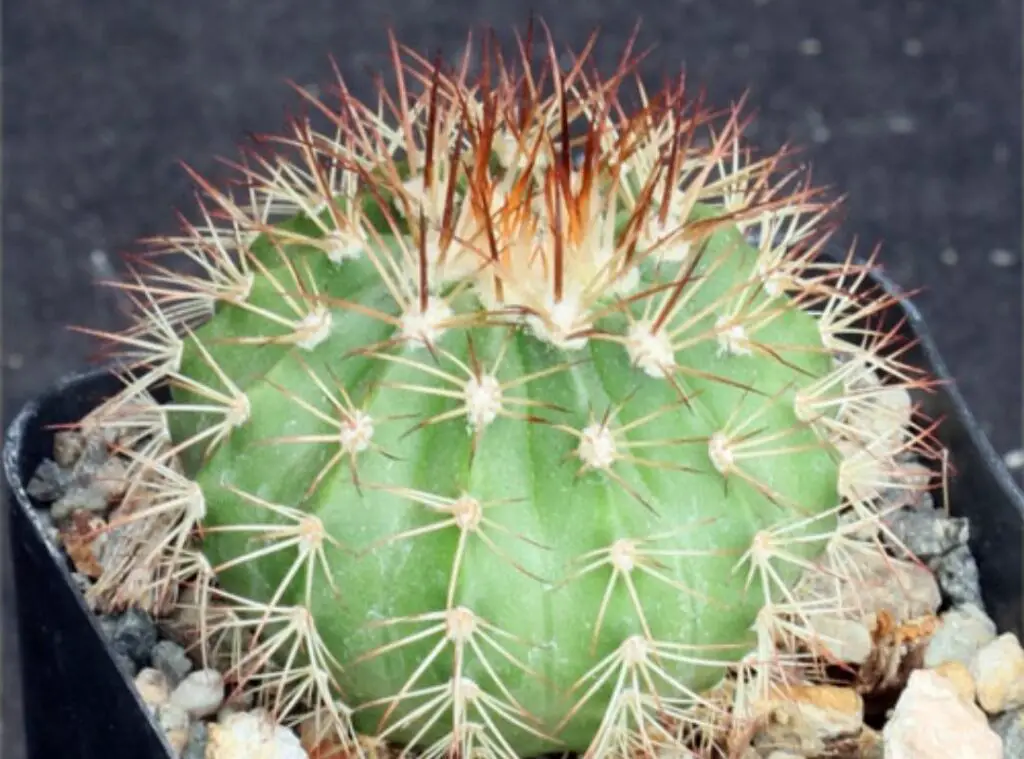Melocactus broadwayi plants are native plants to the West Indies. Many people find them attractive and tend to grow them as indoor plants.
So, if you are interested in growing these beauties, you would find thai article useful as i am going to cover on hown you should look after these plants well , the propagation methods and the issues they may come across.

How do I identify Melocactus broadwayi?
They usually grow as solitary plants. You could identify the mature Melocactus broadwayi Plants as they carry cephalium. Moreover, the mature plant would resemble the look of a smallish barrel cactus.
Melocactus broadwayi stem would be round and conical in shape. Moreover, they would carry ribs which form in a longitude manner as well.
The stem would be 20 cm in height and 20 cm in diameter. Besides they would carry a cephalium which you can spot in white.
Further they would carry brown to red bristles too. They would further carry 13-18 ribs as well. Melocactus broadwayi produce flowers in bright pink to purple.
You could spot the flowering forming on top of the cephalium. Moreover, Melocactus broadwayi form a red fruit item too. They would be pear shaped.
Size of the plant
They would grow up to a height of 20 cm once they are fully grown. Moreover, they would be 20 cm wide once they grow to their best.
Growth rate
They are slow growers.
One look care guide
| Botanical Name | Melocactus broadwayi |
| Plant Type | cactus |
| Mature Size | 20 cm wide and 20 cm tall |
| Sun Exposure | Full sunlight |
| Soil Type | Sandy, well draining |
| Soil pH | Neutral to slightly acidic |
| Bloom Time | Spring |
| Flower Color | bright pink to purple. |
| Hardiness Zones | USDA hardiness zone 11. |
| Native Area | West Indies |
| Toxicity | Non toxic |
| Average price | 7 USD |
How do you take care of Melocactus broadwayi?
Light Requirement
Melocactus broadwayi would perform well if they get full sunlight. This literally means they need to have at least six hours of sunlight to perform well.
As such when you grow them indoors, you need to place them by the brightest sunny windowsill. If you find it difficult to supply sufficient sunlight, you may consider placing grow lights closer to the plants.
If not, you can bring the plants outdoors for some time and bring them in.
Temperature and humidity
Melocactus broadwayi are not cold tolerant plants. In fact, they need to have temperatures above 8-12 degrees Celsius all the time.
The exposure for frost would create frost damage for the plants. They would thrive well in moderate humidity levels.
Is it cold hardy?
Melocactus broadwayi do not handle cold well.
USDA Hardiness Zone
Melocactus broadwayi would thrive well in USDA hardiness zone 11.

Watering Requirement
Melocactus broadwayi can grow optimally with moderate amounts of water. Do not ever leave them to be bone dry.
If you think their soil is dry, you may consider watering them lightly.
On the other hand, if you supply them water in abundance, too much water will cause rot in the plants. Literally the roots cannot absorb water from wet soil and would make the plants more prone towards fungal attacks.
Soil Requirement Type / pH.
It is important that they provide a sandy rocky soil mix for the Melocactus broadwayi plants optimal growth.
That will ensure the plants have excellent drainage. If you use a substrate which has poor drainage , it will result in the rot of the plants.
I recommend using a well-draining cactus mix or a succulent soil mix as those conditions would perfectly suit them. In terms of the right ph. of the soil, best would be to go ahead with a slightly acidic or a neutral ph.
Pot size Potting and Repotting
Melocactus broadwayi do not mind being grown cramped in pots. A slightly larger than the plant’s root ball would suit these plants the best.
Additionally, the pot needs to have ample drainage as well. Unglazed clay pots would be the best for them so that the excess moisture can evaporate faster from the pots.
You need to repot the plants once every two years. You do need to repot them less often as their root system is weak and do not wish to be repotted often.
If you spot the Melocactus broadwayi have outgrown from the pot and if you had freshly purchased them from the garden stores , you should repot the plants. I recommend conducting the repotting during spring.
When repotting, always select a pot which is slightly larger than the previous pot. Next, you need to take the plant out of the old pot and repot them in a fresh pot.
After that, fill the roots with fresh soil mix. When you plant the cactus, you need to grow it in the same depth as it was grown before.
Where to Plant
Melocactus broadwayi would survive in a place where they can absorb sufficient sunlight. Additionally, when you pot them, make sure that you use a well draining soil mix and in a pot which has ample draining.
Fertilizer and time of year
Consider using a balanced cactus or a succulent fertilizer during spring and summer as it would boost the growth of the plants.Do not feed them in fall or in winter/
Flower
Melocactus broadwayi produce flowers in bright pink to red.
Dormancy
Toxicity
Melocactus broadwayi are nontoxic plants.
Common bugs and illnesses
You need to watch out for pests such as aphids, mealybugs and scales when growing them.
Additionally , if you end up over watering them, it will lead to root rot in the plants. Furthermore, it would make the plants more vulnerable towards other fungal infections.
How to propagate Melocactus broadwayi
The Seed propagation method is the best way of propagating them. You can simply sow them in a light sandy soil mix which has a high porosity.
Next cover the germination tray with a glass layer to keep the moisture within. Expose them to a temperature of 18-22 degrees Celsius.
Conclusion
To wind up, Melocactus broadwayi are such a great versatile set of plants which anybody would love to have. So, I hope this article gave you a broader view of handling these plants well. Happy cultivating with Melocactus broadwayi !
Read Next : Melocactus Conoideus | A Cactus With A Weird Head | Melocactus Ernestii | A Cactus With A Weird Head | Melocactus Bahiensis | A Cactus With Weird Head |
